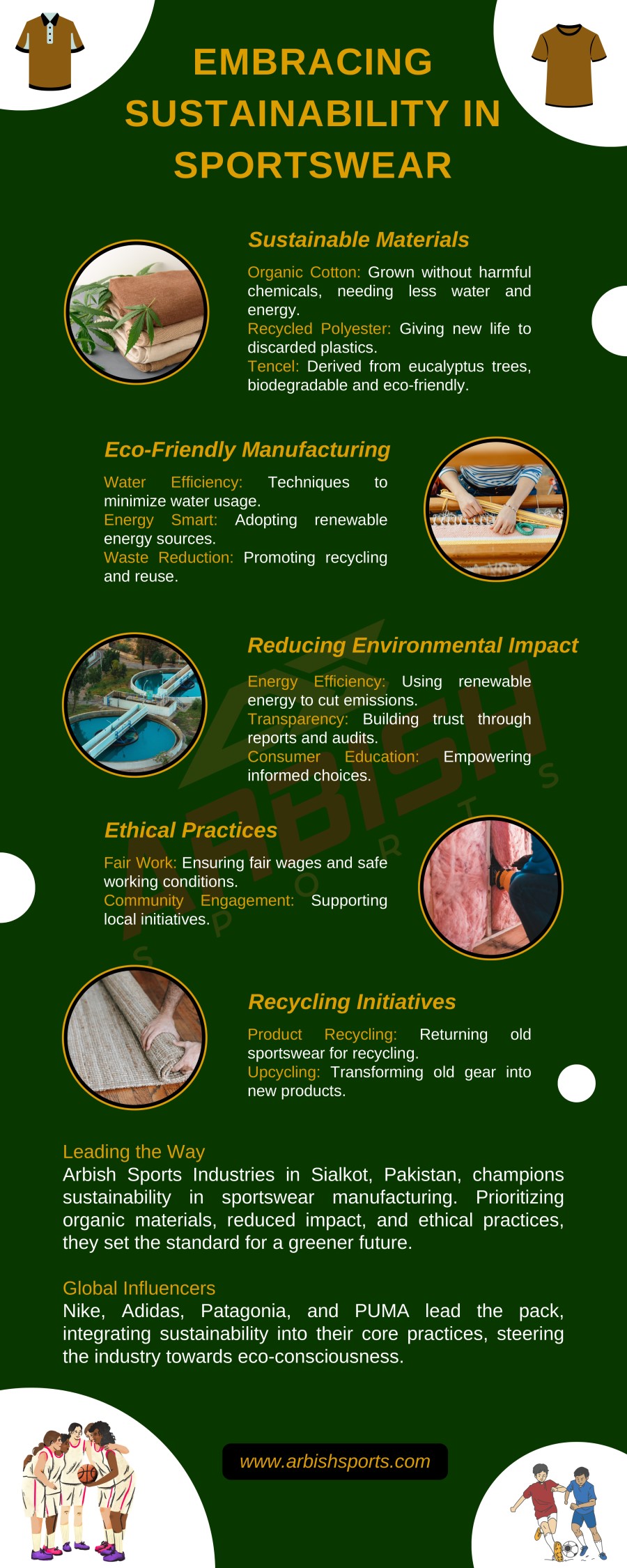How Sportswear Brands Are Embracing Sustainability: A Step Towards a Greener Future

Table of Contents
ToggleHow Sportswear Brands Are Embracing Sustainability: A Step Towards a Greener Future. The sportswear industry is a significant player in the global fashion scene, shaping trends and influencing active lifestyles worldwide. However, this industry’s rapid growth has also raised concerns about its environmental impact. To address these concerns, sportswear brands are increasingly embracing sustainable practices, demonstrating a commitment to a greener future.
1. Sustainable Stuff by Sportswear Brands: What’s in the Mix?
At the heart of sustainable sportswear lies the use of eco-friendly materials. Brands are replacing conventional fabrics with sustainable alternatives, such as organic cotton, recycled polyester, and Tencel. These materials reduce the environmental impact of production, conserve resources, and promote a circular economy.
Organic Cotton: A Softer Footprint
Organic cotton is grown without the use of harmful pesticides or fertilizers, minimizing the ecological impact of agriculture. It requires less water and energy to produce, making it a more sustainable choice for sportswear manufacturing.
Recycled Polyester: Second Life for Plastic
Recycled polyester is derived from post-consumer waste, such as plastic bottles and discarded textiles. This process reduces the amount of plastic waste going to landfills and gives new life to discarded materials.
Tencel: A Sustainable Alternative
Tencel, derived from sustainably sourced eucalyptus trees, is a biodegradable fabric known for its softness, breathability, and moisture-wicking properties. It’s a renewable resource that requires less water and chemicals to produce compared to conventional fabrics.
2. Making It Right: Embracing Sustainability by Eco-Friendly Tricks
Sustainable sportswear brands are also adopting eco-friendly manufacturing practices to minimize their environmental impact. These practices include:
Saving Water: Technologies that minimize water usage during production are being implemented. Waterless dyeing techniques and improved wastewater treatment are becoming industry standards.
Energy Smart: Brands are adopting energy-efficient technologies and renewable energy sources to reduce their carbon footprint.
Waste Less: Waste management strategies are being implemented to minimize waste generation and promote recycling and reuse.

3. Fair and Square: Keeping It Ethical and Transparency
Sustainability extends beyond environmental practices to encompass ethical labor practices. Sportswear brands are committed to ensuring fair working conditions, safe working environments, and fair wages for workers throughout their supply chains.
Fair Work: Brands are increasingly ensuring fair wages and safe working conditions for laborers in their supply chain. Transparency in sourcing and production processes is also gaining importance.
Helping Out: Some brands are actively involved in community projects, supporting local initiatives, and giving back to the areas where their products are made.
4. Recycling Fun: Old Gear, New Vibes
Bring It Back: Brands are introducing programs where consumers can return old sportswear for recycling. This initiative promotes a circular economy by repurposing materials and reducing waste.
Creative Remix: Some companies are exploring upcycling techniques, transforming old sportswear into new products. This not only minimizes waste but also encourages creativity and innovation.
5. Keeping It Real: Being Honest and Reduced Environmental Impact
Energy-Efficient Manufacturing: Brands are adopting renewable energy sources in their manufacturing processes, reducing greenhouse gas emissions.
Transparency: Building Trust and Confidence
Transparency is crucial in building trust with consumers regarding sustainable practices. Sportswear brands are publishing sustainability reports, conducting audits, and engaging with stakeholders to ensure transparency and accountability.
Consumer Education: Empowering Informed Choices
Sportswear brands are educating consumers about the importance of sustainability and empowering them to make informed choices. This includes providing clear product labeling, highlighting sustainable initiatives, and promoting responsible consumption practices.
6. What You Can Do: Joining the Green Team
The shift towards sustainability in the sportswear industry marks a pivotal step towards a more environmentally conscious future. Embracing eco-friendly materials, ethical manufacturing, and circular economy initiatives, sportswear brands are setting a new standard.
Notably, Arbish Sports Industries from Sialkot, Pakistan, stands as a prime example, employing these sustainable methods in their sportswear manufacturing processes. They prioritize organic materials, reduced environmental impact, and ethical labor practices, embodying the commitment to a greener future.
Alongside Arbish Sports Industries, global leaders like Nike, Adidas, Patagonia, and PUMA are paving the way, integrating sustainability into their core practices and influencing the industry’s direction towards a more responsible and eco-conscious approach.





